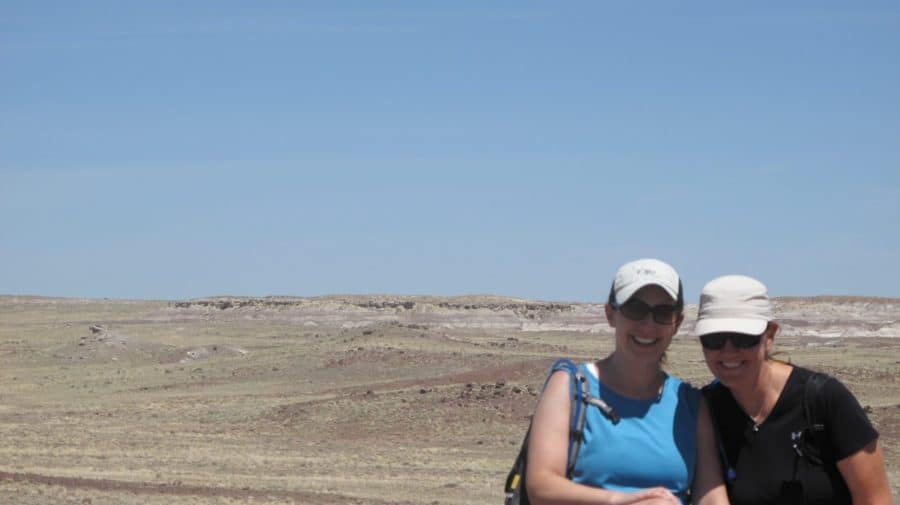How to Find a Good Travel Partner (& How to Be One)
Many people ask me why I enjoy traveling solo, and I have a lot of responses, including that it’s not easy to find a good travel partner. No matter how close of friends you are with someone, it can be difficult to travel together.
This is especially true on an international trip where you don’t speak the local language.
Being a good travel partner isn’t always about compromising, especially if doing so will frustrate you or cause you not to have a good time. It’s about being as considerate of yourself as the person you’re traveling with and ensuring everyone gets most of what they want.
This post includes my thoughts on what makes a good travel companion.

This post may contain affiliate links, which means I’ll receive a commission if you purchase through my links at no extra cost to you. Please read the full disclosure for more information.
1. Reach Agreement Before the Trip
What kind of trip do you expect to go on? Is this going to be a five-star splurge or a bare-bones budget vacation? Are you seeking a relaxing getaway or a jam-packed exploration of a location? City or country?
What is the budget you’re able to spend, and do you both agree? One way to have disagreement and frustration very quickly is if you don’t agree on the kind of vacation you are going on.
Being a good travel partner starts at the beginning of the planning stages. I recommend discussing this when planning the trip to ensure you are on the same page. Then, continue the discussion with the decisions that need to be made.
This dialogue continues until the end of the trip as well. There are a lot of decisions you make while you’re traveling, and it’s important to come to an agreement that you are both ok with.

Areas of Potential Friction
Even amongst the best of friends, you can have very different views about your vacation and your expectations during it. When you start planning your trip, keep these things in mind and discuss any issues throughout.
- Total budget: It’s important to determine an approximate budget before you travel to ensure you’re on the same page about accommodation and activities.
- Priorities: Is cost the driving factor in your decisions or experience? Do you want to be active, see certain things, and connect with people? Knowing your own priorities and those of your travel partner is key to agreeing.
- Where to stay/accommodation: discuss your ideal place to stay before you book, along with your budget. Do you want a hotel or an apartment? Separate bedrooms? What amenities are important?
- Activities: What are the things you most want to do on this trip? Do you enjoy being active, like hiking or biking, or are you more interested in sitting in cafes and watching the world go by?
- Early or late start: Are you more of a morning person or a night owl? Do you take forever to get ready in the morning, or are you in for a quick shower, then you want to dash out the door?
- Downtime: Do you like to go for 12-hour stretches or take breaks during the day, either when you’re out and about or going back to the room to rest?
- Alone time: Are you used to being with someone 24/7, or do you need some “me time.” What does that look like to you: reading a book in quiet, separate rooms, solo time?
- Dining/types of cuisine: Besides the budget, what type of restaurants do you enjoy eating in? Take out, sit down, street vendors? Do you want to dress up or go casual? Local and ethnic or American-style food (or that of your country).
What to Do When You Disagree
You don’t want to get up before 8 a.m., and your travel partner wants to be up and out by then. Or you have simple needs and want to stay at budget accommodation in a safe area, but your travel buddy has loftier expectations.
Take the time to talk through these things and work towards a compromise you can both be happy with.
When I went to Italy, I had a day when I was feeling exhausted. My friend wanted to go to a market, but I was not up for all of the hustle and bustle.
Instead of trying to talk her out of it or her trying to talk me into it, I encouraged her to go and enjoy herself while I took a nap. I was nice and rested when she returned, eager to get back out there to see more.
Alternatively, we could have agreed to go to the market on a different day and do something more chill instead.
Don’t be afraid to do your own thing for a while if something is significant to you. Or if there’s something your friend wants to do that you don’t, maybe you can offer to do something he wants to do for him to come with you for what’s important to you.
Compromise and being considerate of each other are what it’s all about.
2. Share Responsibility and Effort
A lot of work goes into planning a trip, before the trip and during. Vacations are fun, but a lot of work goes into making it that way unless you go on a guided trip where everything is planned for you.
There is research to do before you go, bookings to be made, and decisions to be made before and during the trip. It’s a good idea to expect to share those responsibilities to have a good time on the trip.
Several people I have traveled with assumed that since I travel so much, I love to do all the work. The truth is that I enjoy going on great trips, and I’m willing to do the work needed to achieve the result I want.
So, if you’re not offering to help with the research, then offer to do something else.
Some Examples
For example, on a recent trip I took with a friend to Alaska, I did most of the research before the trip. She did all of the driving.
I was over the moon as I hadn’t driven on the snow and ice for many years and was a little concerned, especially at night (I am NOT a night owl). She took that worry from me, so we both felt it was a great share of work.
Alternatively, I went on a trip to Costa Rica with a friend, which was the opposite experience. I planned everything before the trip and even heard her tell someone that she let me because I love doing it (she never asked if that was the case).
Then, I had to make every decision during the trip. This included when to go places, where to eat, and research restaurants. I tried to go for a walk to get some “me” time, and she insisted on going.
Needless to say, it was a very frustrating trip and not a fun experience for me at all.
3. Talk About Splitting Costs
Talk about how you plan to split costs during your trip before you leave. Do you plan to alternate meals or split the bills? Will you get the rental car, and the other get meals?
Or will one person pay for everything, and the other will pay after the trip? However you do it, make sure you agree and both feel comfortable.
4. Have Patience
Traveling can be stressful, particularly internationally, when you don’t speak the local language. Patience certainly is not one of my virtues, but when traveling, you have to dig deep to find it where you don’t know you have it.
I remember on my first trip to Asia, after a painfully long and sleepless flight, we arrived at a ridiculously crowded airport. I don’t recall what set my friend off, but it was about figuring out where we had to go.
He had a bit of a meltdown at the airport. That was ok—I was on it. I suggested he sit down and watch our bags, and I’d head out to figure things out.
It could have escalated to an argument since we were exhausted and cranky, but it didn’t. Don’t worry; I paid him back later in the trip with my meltdown.
He was equally patient with me and cared while I cooled off. Travel is all about teamwork when you travel with others.
5. Consideration and Compromise
No matter how close of friends you may be with your travel companion, you will have differences of opinion on things during the trip. How you handle it is essential to make for a great time on vacation.
Do you want to see something your friend doesn’t? Or does your travel partner want to stay in, but you want to go out? Take turns with the decision-making; remember, it’s ok to do things independently.

6. Communication Before & During the Trip
It is crucial that you express your needs and wants during a trip. Of course, this is important at any time in any relationship. When you are traveling with a person, it’s essential.
Say what you want or what you need, and listen when the other person does the same. Although you may be friends, hanging out together and living together, even for a week or two, is very different.
Ask questions instead of assuming. Is your friend in a bad mood or angry with you? Ask the question so you can handle it so it doesn’t fester on the trip. I didn’t heed this advice once, and it strained a friendship.
I got angry and didn’t want to start a fight, so I didn’t talk to my travel partner for a couple of days on the trip. Talk about uncomfortable and awkward! It’s a shame, too, as we had a good time before then.
How to Find a Good Travel Partner
Finding a travel buddy can be challenging, and finding a good one is even more challenging. Before you consider joining a person on a trip, it’s essential to consider your wants and expectations.
Talk about them with your potential travel partner to see if you align. When you get frustrated, as you invariably may at some point in the trip, step back and consider if you are a good travel partner.
Think about how you can open a dialogue to work through the issue so you can continue to have fun.
You Might Also Like
- How I Plan My Trip to Travel Internationally
- 11 of the Best Tips for Travel: What I Wish I Knew Earlier
- 10 of the Best Reasons for Traveling
Like it? Pin it!




So you’ve traveled with your cousin a few times…how is he as a travel partner? I am thinking he is one of the easiest people to travel with. ????
I’ll let you know the next time we travel together! 😉